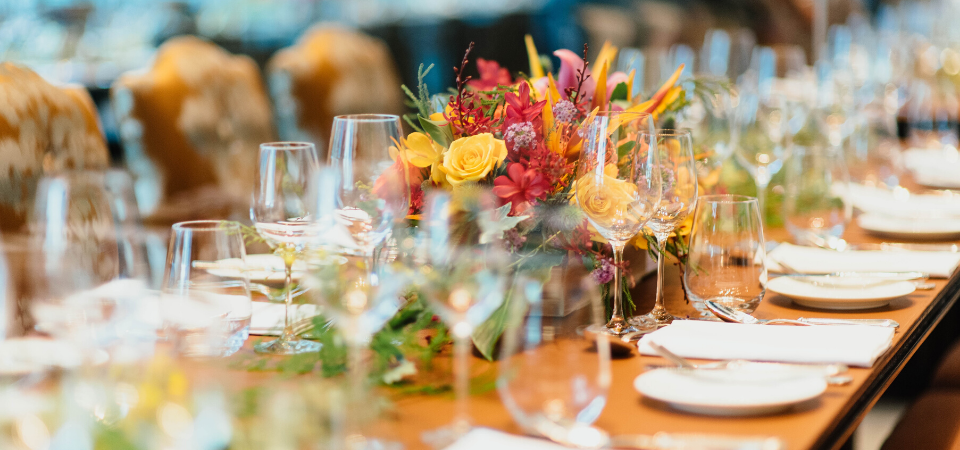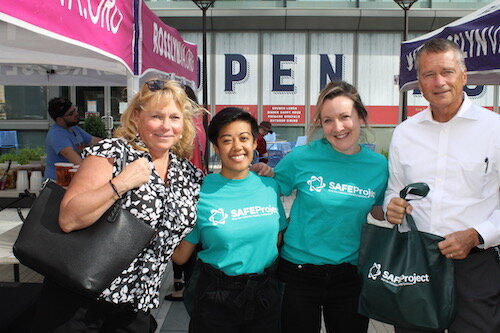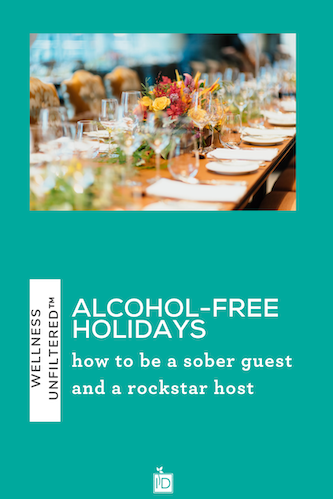Alcohol-Free Holidays: How to Be a Sober Guest and a Rockstar Host
As the holidays approach, so do the parties and celebrations. While it’s a great time to connect with others, the focus on drinking can be challenging for some people. Personally, I can relate to the worry and judgement of not drinking at a function.
I’m in recovery and have not had a drink in the last 5 years. I also love parties, celebrations and do not want to miss out (#FOMO is real!). So, whether you’re practicing a new lifestyle change or cutting back your alcohol intake for the holidays, here are Sazha’s Tips for spending the holidays alcohol free.
HOW TO BE A SOBER GUEST
First, I’m not shy about my recovery from substances. While I do not shout it to the rooftops, I don’t lie if someone asks me. I have a substance use disorder, and I decide how much or how little I share depending on who I am with and where I am. A part of substance free lifestyles is the stigma that exists because you don’t drink anymore. If you’re comfortable, share. If you’re not, take a look at the tips below:
Declare yourself the designated driver which removes all self-stigma from not joining everyone else in drinking.
Plain tonic water with lime is a great beverage because no one asks, “why are you not drinking?“ I also do this at social hours or dates when I do not want the focus to be on why I abstain.
Super nosy questions? Tell them any of the following: For health reasons. I’m on medication. I’m on a cleanse. It’s for my wellness.
If you know you will be triggered, attend holiday functions with a sober companion or let a companion know, “Tonight I am not drinking.” Having someone to hold you accountable or keep an extra eye on you can make these functions easier.
Find other ways to connect with people through playing board games, or striking up a conversation.
Want to be sure there’s something you can drink? Be an awesome guest by bringing your favorite non-alcoholic beverage to share.
HOW TO BE A ROCKSTAR HOST
Are you hosting a holiday party and want to be inclusive and supportive of anyone who may be choosing an alcohol free lifestyle? Our team at SAFE Project includes people in recovery and recovery allies who support people in recovery. Here are their tips:
When you're hosting an event, the point is to get together—not focus on who is or isn't drinking. Make it as easy for someone to find the sparkling water, ginger beer, or mocktails as it is to find the bar. Setting up two equally festive locations makes it easier on everyone to find what they want, without a sole focus on alcohol.
Want to be a rockstar host? For guests who have shared privately that they don’t drink or won’t be, you can be their party wingwoman. Tell them privately that you are there to support them, make sure they are comfortable AND have a good time.
Whether I’m a host or a guest, I do my best to support others. You can do the same by not using, or asking them if it's okay to check in a few times during the event. That way, you can help them arrange a possible escape plan if the situation becomes uncomfortable or triggering.
For young adults at gatherings that may have drinking games, I make sure to use that time to disengage from the games and find/offer other things to do.
A small thing that is often appreciated is just taking significant effort to have high-quality non-alcoholic drinks (sparkling juice, kombucha, bottled sodas, etc.). If you're looking to get really dedicated as an inclusive host, non-alcoholic spirits are available for mocktails.
Sazha Ramos with National Director, Sam Forcum and SAFE Project Co-Founders Ret. Adm. James Winnefeld & Mary Winnefeld
Being in recovery doesn’t mean just living a sober lifestyle—it also means recovering from my previous behaviors and beliefs. Today, I put my self-care first in social situations. I learned boundaries— when to leave and when to say no. Connecting with the people I’m with, and not the alcohol in the room has transformed my life. Have other tips to share? Let us know in comments.
ABOUT SAZHA
Sazha Ramos is SAFE Project’s Manager of Recovery Housing. She represents a wide variety of populations in recovery: collegiate recovery, a veteran, young person, female, person of color, and and advocates for safe and supportive recovery housing. SAFE Project is a national nonprofit committed to ending the addiction epidemic.














